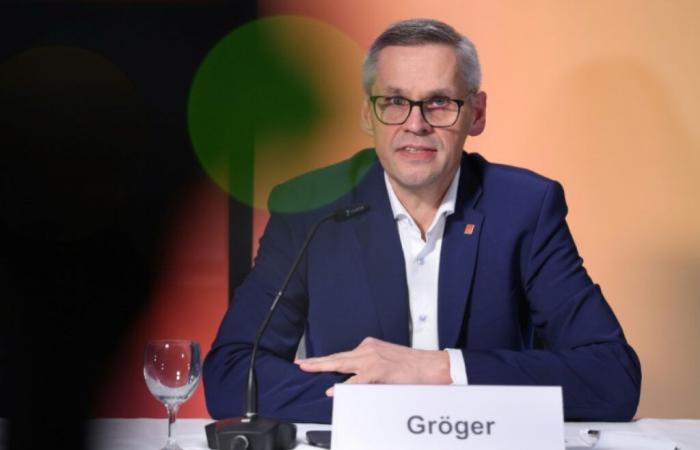Thorsten Gröger, negotiator for the automobile union, during a press conference, December 20, 2024 in Hanover, Germany (AFP / Ronny HARTMANN)
Europe's leading carmaker Volkswagen will cut more than 35,000 jobs in Germany by 2030 and reduce production in the country, while avoiding factory closures and layoffs as part of an agreement sealed on Friday to try to save the group in crisis.
Management and the union showed their relief at this compromise, which was concluded with forceps after three months of tense negotiations, punctuated by two strikes which brought the group's sites to a standstill.
The agreement provides for “a socially acceptable reduction in the workforce” of more than 35,000 people on the German sites of the Volkswagen brand by 2030, or 29% of its total workforce, announced the manufacturer, flagship of German industry.
These departures will not be forced, staff representatives stressed. Many retirements, in particular, will not be replaced.
The formula found “guarantees jobs, preserves production in factories and at the same time allows significant future investments”, said Thorsten Gröger, negotiator for the automobile union.
“There will be no factory closure, economic layoffs are excluded,” he assured while this scenario had been on the table for months.
– The Golf goes to Mexico –
According to the unions, management initially demanded the elimination of 55,000 jobs.
In exchange, employees agreed to waive a certain number of bonuses and reduce production capacity in several of the group's ten German factories, which will be reduced by more than 700,000 units.
They are also sacrificing a minor site: the Dresden factory (East), which employs around 340 people, will no longer produce cars after the end of 2025. And a symbol: the iconic Golf will be produced in Mexico from 2027, and more in the cradle of the group, in Wolfsburg (north).
On this site, which is also the headquarters and largest global factory of Volkswagen, two out of four production lines and 4,000 jobs will be eliminated.
The Osnabrück facility (West), where Volkswagen employs 2,300 people, should no longer produce vehicles after mid-2027, with a view to “another use” of the factory. According to the German business daily Handelsblatt, the group is looking for a buyer.
The two parties have been negotiating almost continuously since Monday to reach an agreement before the end of the year.
Thanks to this agreement, Volkswagen hopes to generate “4 billion euros per year” in savings in the medium term, of which 1.5 billion would come from lower labor costs and a gradual reduction in the workforce.
A salary freeze is planned for 2025 and 2026, as well as the spreading of certain bonuses over several years
– VW “increasingly smaller” –
Volkswagen is suffering from the global slowdown in car sales, Chinese competition, unattractive battery models which are slowing down the momentum of its transition to electric, and high labor costs.
With the announced reductions, “VW is becoming smaller and smaller in Germany”, comments Ferdinand Dudenhoeffer, automotive industry expert at the Center Automotive Research (CAR), to AFP.
The same goes for many of the country's historic automakers, he analyzes, adding that “Germany is losing its importance for the automobile industry.”
Volkswagen's woes epitomize the broader malaise in Europe's largest economy, which has been hit by high energy prices and is heading toward a second straight year of contraction.
Beyond the employees, the whole country was waiting for the verdict of the country's largest industrial employer.
Sabine Timpe, employed in a VW services subsidiary, told AFP that she was “terrified” by the current crisis.
“My grandfather always said: 'Once you are at Volkswagen, you are at peace until the end of your life,'” said this 60-year-old woman whose two children also work at VW and who demonstrated in December in Wolfsburg, headquarters and largest factory of the group.
The crisis at Volkswagen is also a central issue in the campaign for the legislative elections on February 23 in Germany.
Social Democratic Chancellor Olaf Scholz, who is fighting for a second term despite his unpopularity, took up the cause of the employees because, according to him, “bad management decisions contributed to the situation”.






